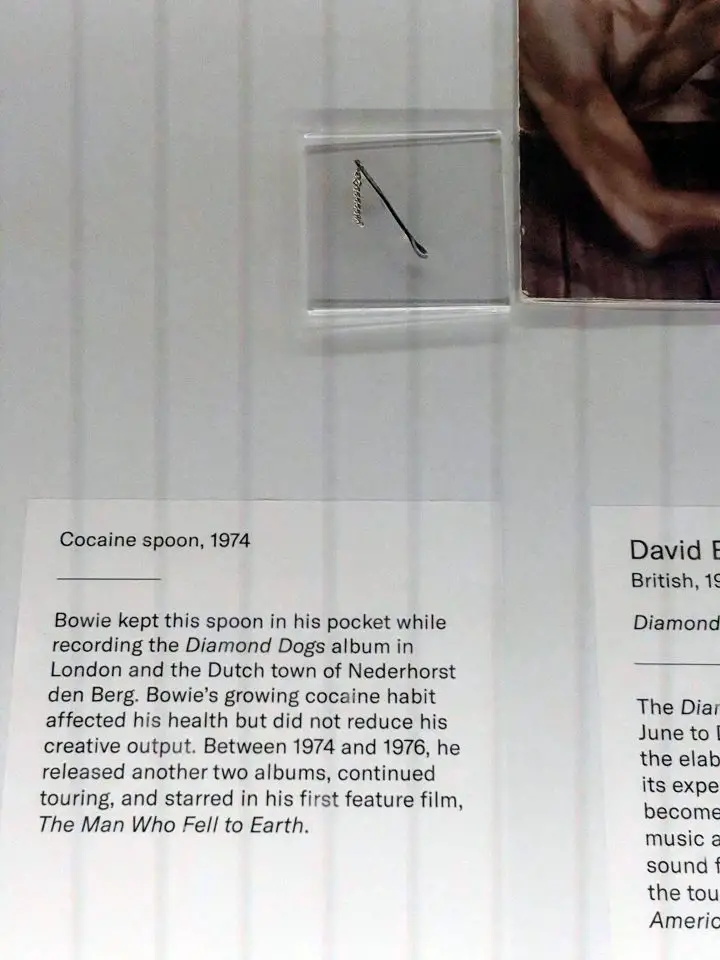1973-74
The Ziggy Stardust Tour ended on 3 July 1973 at London’s Hammersmith Odeon, where David Bowie famously broke up the band. Bowie planned his next moves in the weeks afterwards, including the Pin Ups album, a collaboration with the singer Lulu, and the TV special The 1980 Floor Show.The show was a point of transition for Bowie, marking the time when he finally bade farewell to Ziggy and glam rock, and launched his new direction into soul music.
In the month it was filmed, October 1973, Bowie also began work on the Diamond Dogs album, laying down a medley of ‘1984’/‘Dodo’. This was also his final collaboration with Mick Ronson and Ken Scott, both key ingredients in Bowie’s early commercial success.
My drug addiction really started, I suppose you could pin it down to the very last months of the Ziggy Stardust period. Not in a particularly heavy way, but enough to have probably worried some of the people around me. And after that, when we got into Diamond Dogs, that’s when it was out of control. From that period onwards I was a real casualty. I’ve not met many people that… I was in a very serious state. You just have to look at some of the photographs of me, I cannot believe I actually survived it.
Mojo, July 2002
Cocaine had a marked effect on Bowie’s personality, making him colder and impersonal, even to friends, lovers and former bandmates.
Having dispensed with the Spiders From Mars, he chose to arrange and produce Diamond Dogs himself. He also performed the majority of the guitar parts, and underwent a period of unusually dedicated practice prior to entering the studio.
I knew that the guitar playing had to be more than okay. That couple of months I spent putting that album together before I went into the studio was probably the only time in my life where I really buckled down to learn the stuff I needed to have on the album. I’d actually practise two hours a day. I knew the sound in my head, and at that time I didn’t know musicians who could carry it off.
Guitar Player, June 1997
Bowie was no stranger to hard work, but this bout of monomania coincided with the beginnings of his slide into cocaine addiction.
I honestly don’t remember having much of a personal life. It obviously had no importance to me. My memories of private living really start in the ’80s, when it slowly dawned on me that I needed another kind of life, as well as the obsessively workaholic one. I mean, if you think I work hard now, you don’t know how crazed I was in those days. But I wasn’t really ever playing! It all went into the work. I wasn’t a person who went out clubbing much or anything.
Uncut, October 1999
Drugs also inveigled themselves into Bowie’s lyrics: Diamond Dogs is awash with references, a running theme throughout the tales of prostitution, poverty and opportunism.
In the song ‘Candidate’, “the poisonous people” can be seen as allegories for drugs, some of whom “make you sing and some make you scream/One makes you wish that you’d never been seen”. It ends with the lines: “We’ll buy some drugs and watch a band/Then jump in the river holding hands.”
In the next song, ‘Sweet Thing (Reprise)’, Bowie asks “Is it nice in your snow storm, freezing your brain?” Whereas ‘Candidate’ had ended defiantly and triumphantly, here he hints at a struggles with addiction: “It’s a street with a deal, and a taste/It’s got claws, it’s got me, it’s got you…”
Even ‘Rebel Rebel’, the album’s most radio-friendly song, wasn’t immune. “You got your cue line and a handful of ‘ludes”, Bowie sings, referring to cocaine and Quaaludes, the latter previously referenced in Aladdin Sane’s ‘Time’.
The drug references continued in the second half of Diamond Dogs, from “You’ll be shooting up on anything, tomorrow’s never there” in ‘1984’ to the instruction “Don’t talk of dust and roses/Or should we powder our noses?” in ‘Big Brother’, and the final confessional “Lord, I’d take an overdose, if you knew what’s going down.”




I thought it was a dolphin with Iman on it, not a man. This he said on a talk show, and he showed the tattoo tot he audience.